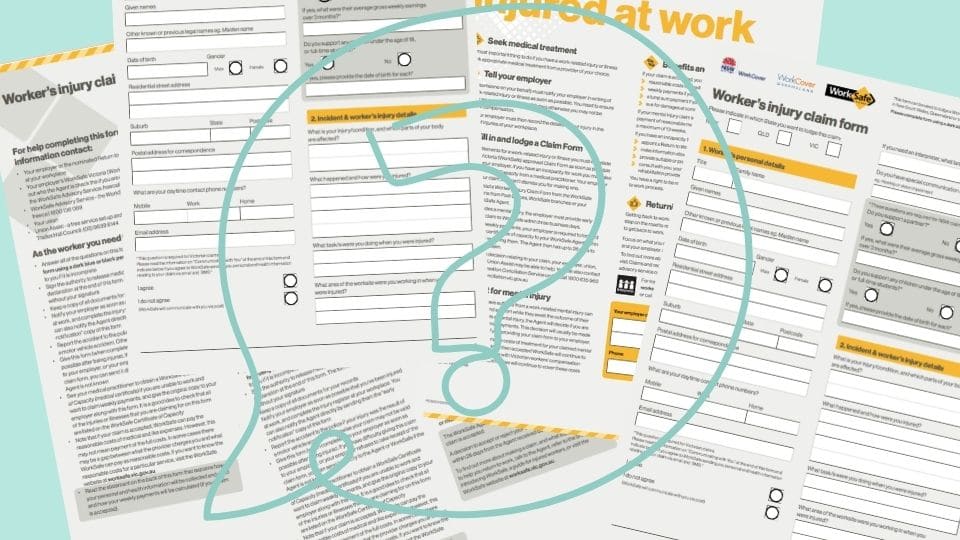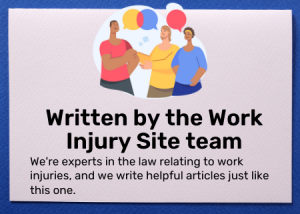If I get injured at work can I sue?

You are able to sue if you get injured at work in some cases.
After suffering an injury at work, some people wonder whether they are able to sue.
They may want to sue their employer, a manufacturer of a defective piece of machinery or even another person such as a work colleague that they deem responsible for their injury in some way.
The answer to the above question is not a straightforward one and requires looking at a few different things.
Table of Contents
The first step is having a WorkCover claim accepted
The first step if you suffered an injury at work and wish to sue down the track is to lodge a WorkCover claim.
By lodging a WorkCover claim, it is important to keep in mind that you are not suing anyone.
Anyone that is injured in Victoria regardless as to fault is entitled to pursue a WorkCover claim and have it accepted.
If you want to read more about what happens when your claim is accepted, you can do so here.
There does not need to be fault or negligence on behalf of another party in order to pursue a WorkCover claim.
For example, you could hurt yourself at work and no one else is to blame for that injury.
The law in Victoria says you are still able to have an accepted WorkCover claim.
This is because Victoria has both a no fault and fault system.
This means that you are able to access some WorkCover benefits where there is no fault on behalf of someone else, and one WorkCover benefit where fault is required.
More on this later on in this article.
Once you have an accepted WorkCover claim, before you can sue another party for your injury (pursue a common law claim) you need to wait until your injury has stabilised.
That is, you usually can’t suffer an injury and then sue in the weeks or months after the injury (this is generally speaking, there are exceptions to this).
So you need to wait until your injury stable which means that it is not getting any better and not getting any worse. It has played out.
The reason that you need to wait until your injury has stabilised is because what you were getting compensated for is permanent impairment.
And you don’t know what that permanent impairment will be in most cases until an injury has stabilised.
What then happens is you need to obtain a serious injury certificate.
You can read more about serious injuries here.
The reason for obtaining a serious injury certificate is to show that your injury reaches a threshold in terms of how serious it is, taking into account the impact of the injury on your life.
If you have a minor injury – one that doesn’t really impact your life, or one that might not be permanent, it is highly unlikely you will get over this hurdle and show that you’ve got a serious injury.
So not everyone that suffers an injury in negligence circumstances can sue.
To obtain a serious injury, you must satisfy one of two tests.
Either the narrative test or the deemed 30% test. These are explained in the article above.
Obtaining a serious injury certificate can take anywhere from a couple of months all the way up to, in a minority of cases, 12 months or more.
Once you have obtained a serious injury certificate then you are able to pursue a common law claim for damages (that is, you are then able to sue).
Who do I sue?
In most cases, if you were injured at work your employer would normally be named as the relevant other party.
Sometimes other parties may be named. For example, if you suffered injury while working and a piece of equipment filed, the manufacturer or and/or the retailer of the piece of machinery may be named as well.
One important consideration when suing is ‘duty of care’.
You can read all about the issue of duty of care here.
In a nutshell, a duty of care is an obligation to avoid doing something or failing to do something that could lead to harm of another person.
If it is found a duty of care is breached and as a consequence someone suffers an injury, then the company or person responsible for the breach could be considered to be negligent.
Employers owe a duty of care to their employees. Employers have a responsibility to provide and maintain a workplace that is safe, and they need to take reasonable steps to ensure their workers don’t come to harm where there might be a reasonably foreseeable risk that an injury could occur.
That being said, employees also have a duty of care to take care of their own safety and the safety of others.
In addition to this they also have a duty to comply with their employers occupational health and safety measures.
if you pursue a common-law claim, it is likely that your lawyers will argue that a duty of care was owed to you by your employer and if that was breached and that as a consequence you suffered an injury.
If you think another employee was responsible for your injury then the concept of vicarious liability is relevant. This basically means that even if a another employee acted in properly which resulted in you suffering injury, the employer can be considered vicariously liable for the injury.
Conclusion
So, if you hurt yourself at work in some cases you are able to sue.
You need to lodge a WorkCover claim and have that claim accepted.
Before you can sue, you need to wait until your injury or injuries have stabilised.
You must then obtain a serious injury certificate and once you have done so, you need to prove that there was negligence on behalf of another party to succeed.







